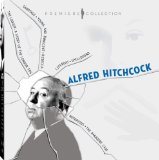| Reviews & Columns |
|
Reviews DVD TV on DVD Blu-ray 4K UHD International DVDs In Theaters Reviews by Studio Video Games Features Collector Series DVDs Easter Egg Database Interviews DVD Talk Radio Feature Articles Columns Anime Talk DVD Savant Horror DVDs The M.O.D. Squad Art House HD Talk Silent DVD
|
DVD Talk Forum |
|
|
| Resources |
|
DVD Price Search Customer Service #'s RCE Info Links |
|
Columns
|
|
|
Alfred Hitchcock Premiere Collection
THE MOVIES:
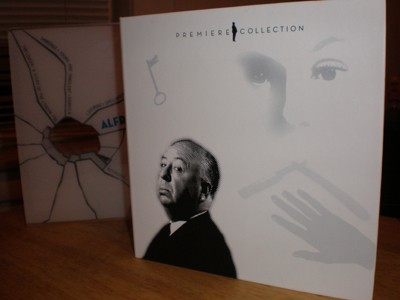
2008 is shaping up to be a pretty good year for Alfred Hitchcock. First, Universal gives a trio of his movies the royal treatment as part of their Legacy Series, and now Fox weighs in with the Alfred Hitchcock Premiere Collection, collecting eight of the thrillmeister's early movies in one of the most handsome packages I've seen this year.
Pretty much all of the films included in the Premiere Collection have been on DVD before, including skeevy public domain releases and three long out-of-print Criterion discs. Lifeboat has even been released by Fox before, and that excellent "Special Edition" is reprised here. For many, this set offers the best versions I have seen yet on DVD, and the large selection of bonus features should be an enticing lure for Hitchcock fans looking to beef up their collection.
However, don't pop the champagne just yet. Though I love the movies and the way this is put together, there are some manufacturing problems in terms of DVD playability. For more on this, please see the final section following the individual critiques of the eight movies.
Below, I will go through the films one by one, in chronological order, and rather than discussing the extras at the end of the review like I'd normally do, I'll note what the DVDs contain as I go.
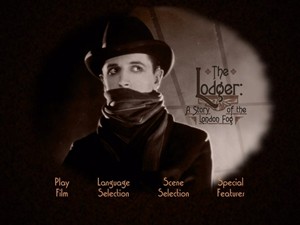
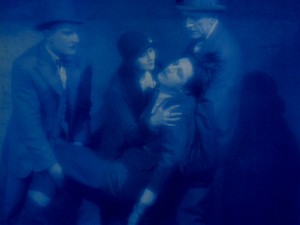
* The Lodger: A Story of the London Fog (1927): Considered by Hitchcock to have been his first real movie, this silent chiller is based on a novel by Mrs. Belloc Lowndes. The book is an early entry in the extensive Jack the Ripper lore, and one of the very first pieces of fiction to try to offer a solution in the case. This movie version never mentions Jack, instead showing us a similarly styled killer calling himself "The Avenger." Every Tuesday night for several months, the Avenger has murdered a fair-haired woman and left behind a mysterious calling card featuring his moniker inside a triangle.
Thus, suspicions are high and nerves are on edge when an odd new tenant moves into a rooming house near where the latest killings have taken place. Jonathan Drew, played by early British film star Ivor Novello, keeps to himself and has several "queer" habits, such as demanding all the portraits of women be taken out of his room. (There seems to be some implication that he isn't just "queer" as in "weird," but the landlady also suspects he is gay.) If Drew is the Avenger, though, he's picked a rather bad place to set up shop. While the landlords' daughter, Daisy (Marie Ault), would make a perfect candidate for the next victim, her suitor (Arthur Chesney), is a police detective on the Avenger's trail. Naturally, Drew's odd behavior endears him to Marie while alienating everyone else, and the next Tuesday, the cop will make his move.
The Lodger has several telltale Hitchcock moves, from the innocent ingénue being drawn to dark forces and the resulting romance to the theme of a man being wrongfully accused. There are snooping neighbors, ostentatious settings (Marie is a clothes model), and several red herrings and deceptively tense sequences where all is not as it initially appears. The movie is an effective character piece, well constructed by the young director. He manages to draw convincing, demonstrative performances from his actors, and Hitchcock is also already experimenting with mis-en-scene and other conventions of film language. Of particular note are his creative title cards that mimic theatre marquees and announce characters in a visual equivalent to signature motifs we often hear in film scores.
Audio/Video: The Lodger is shown in full frame with a tinted black-and-white picture. The restoration here is quite remarkable. The main image is largely crisp and easy to see, despite some expected print damage and a little edge enhancement. The only previous print I had seen of this movie was dark and muddy, and seeing this newly cleaned version is a revelation.
Two contemporary scores are offered to accompany this silent film: a 1999 composition by Ashley Irwin (mixed in 5.0) and a 1997 piece by Paul Zaza (mixed in mono). Both are quite good. I sampled back and forth, and have no great leaning to one or the other--though I did find Irwin's joking allusion to the famous Psycho stabbing scene to be quite funny.
The title cards are subtitled in Spanish and French.
Extras: All of the movies in the Premiere Collection include audio commentaries by film historians and Hitchcock experts, and the set leads with Patrick McGilligan's analysis of The Lodger. Given that these commentators weren't part of the production, these are not tracks of personal reminiscences from the set, but rather focused on the meat and potatoes of filmmaking. What is on the screen is discussed alongside the greater social context and historical information about the production and the participants.
For those who are starting fresh with Hitchcock, the 23-minute documentary "The Sound of Silence: The Making of The Lodger" focuses not just on the film in question, but also on the director's biography and how he broke into cinema. Illustrated with clips and still photos, as well as snippets of audio interviews Hitchcock gave to Peter Bogdanovich (who also appears on screen), the documentary features a litany of commentators whose names will become familiar across the Premiere Collection. These critics, historians, and biographers include Drew Casper, Tom Schatz, Jonathan Friedman, Will Schmenner, Stephen Rebello, Raymond Benson, Leonard Leff, Robert Yanal, Dennis Wolkowicz, Richard Schickel, and others. Hitchcock's granddaughter, Mary Stone, also appears, and she has her own short featurette, "Hitchcock 101" (3:20), in which she shares an anecdote about taking a film class focused on her grandfather. Additionally, we get separate audio segments from Hitchcock's interview with Peter Bogdanovich, as well as from his legendary talk with Francois Truffaut. The latter feature recurs throughout the set (though only intermittently with the Truffaut conversation) and play against a blank screen.
Other extras include a 1940 radio play of the story (also played against a black screen), a stills gallery featuring behind-the-scenes photos and publicity material, and a short restoration comparison, which is a regular feature on these discs.
Movie: 4 stars, Disc: 5 stars
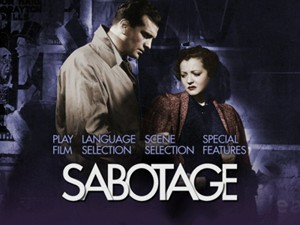
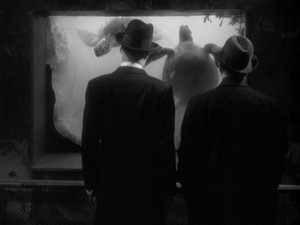
* Sabotage (1936): Based on a novel by Joseph Conrad, this spy thriller seizes on the paranoia that was infiltrating British life in the preamble to WWII. Oskar Homolka (Mr. Sardonicus) plays Verloc, an immigrant who runs a movie house in London with his young American wife, Winnie (Sylvia Sydney, You Only Live Once). Verloc is rightfully suspected to be a saboteur, and a gregarious agent of Scotland Yard, Ted (John Loder, Lorna Doone), is staking out the theatre from the grocer's next door. He makes friends with Winnie and her little brother Stevie (Desmond Tester), getting closer to them as he gets closer to the truth about Verloc.
Sabotage has one failing, and that's that we maybe see too much behind the scenes as to what Ted and Verloc are up to, which in some cases takes some of the suspense out of the situation. At other times, it helps to amp up our tension, however, since we know, for instance, what is in the dangerous package that Verloc sends out with Little Stevie. Hitchcock's depiction of terrorism has a haunting, on-the-ground quality, with the threat placed amongst an unsuspecting public. It could be any of us riding the wrong bus on the wrong day. The director's visual representations of grief and guilt are also quite effective, with Winnie's nervous visions working quite well to create an aura of sadness and anxiety.
Sylvia Sydney is quite fetching as Winnie, giving her some of that American moxie we expect from movie heroines of the period, but also sublimated by her dependence on Verloc and the sacrifices she will make to take care of her brother. Oskar Homolka is also very menacing as the nervous, morally conflicted saboteur. His motivation is primarily money rather than any national pride (there is little indication of what country he is actually from), and his lack of belief actually makes him more despicable. John Loder is the weak link, trying too hard to be the amiable joker. Even if that's his agent's cover, it doesn't quite work.
Hitchcock is already honing his skill at building suspense, cutting back and forth from the various participants to keep us guessing as to what is actually happening. Verloc's main plot is staged with a time deadline, and as Hitchcock unravels the scheme, he ups the personal stakes for the audience to make us even more fearful of the outcome. He also has some fun taking jabs at the movie industry and the demands of its audience, noting our voyeuristic bloodlust and our belief in a new breed of hero through the choice of movies booked at Verloc's theatre.
Audio/Video: Sabotage's 1.33:1 image is of fairly good quality, restored nicely with acceptable surface noise and edge enhancement. Sometimes the edges of the frame go out of focus, but this, like pretty much all of the problems with the Sabotage disc, appear to be problems with the source and not with the actual DVD creation.
The original soundtrack is mixed in mono and is pretty clean, mostly free of hiss or other problems. There are English, Spanish, and French subtitle options.
Extras: Historian Leonard Leff provides the audio commentary for Sabotage, and he does a good job of dissecting the complicated history of the production. In addition to this, there are also what will be the standard for most of these discs: audio excerpts from the interview with Peter Bogdanovich, a stills gallery, and restoration comparison.
Movie: 3.5 stars, Disc: 4 stars
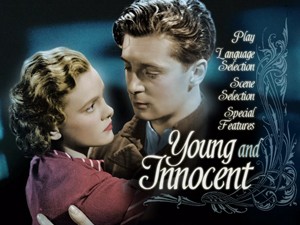
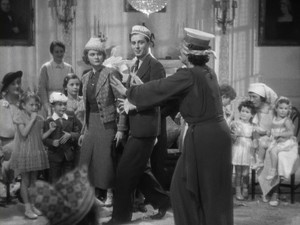
* Young and Innocent (1937): Though arguably a minor Hitchcock effort, this fugitive story is also prototypically Hitchcock, showcasing a man wrongfully accused on the run, searching for the one object that will clear his name. In this case, it's a stolen raincoat, and if down-on-his-luck movie writer Robert Tisdall (Derrick De Marney, Spitfire) can find it, he can prove he didn't kill the actress whom he may or may not have been having an affair with. Helping him on his flight from justice, at first reluctantly and then with the romantic fervor befitting the teenage heart, is no less than the constable's daughter, Erica (Nova Pilbeam, previously in the original The Man Who Knew Too Much). The more Erica becomes convinced of Robert's innocence, the more dangerous the situation gets--both her life and her heart are under threat.
Both De Marney and Pilbeam are fairly charming in the leads, though neither of them really distinguishes themselves as stars on the rise. The true stars of Young and Innocent are the many back-road locales Hitchcock takes us to, flitting between opulent country estates and rundown flop houses. The Tisdall character has basically been living his recent life as a tramp, and tracking his coat takes him and the girl deeper into the poor underbelly of 1930s England. Thus, the Innocent of the title both refers to Robert in terms of his involvement in the killing and Erica in terms of the life lesson she will learn. In some ways, she prefigures the young girl in Hitchcock's Shadow of a Doubt who discovers that the way of life she has been raised to believe in may harbor darker shades of morality, including gray areas that aren't as simple as her law-enforcing father would have her believe. (This black-and-white world is also very much a man's world, as evinced by Erica being the only daughter in a motherless clan of boys.)
The tone of Young and Innocent is pretty light, with lots of humor and, of course, a healthy dollop of romance. Hitchcock has some fun with bumbling cops, but also is fairly ambitious in some of the action sequences, showing cars racing trains and one harrowing scene inside a collapsing mine.
Audio/Video: Of all the discs in the Premiere Collection, this full frame transfer of Young and Innocent is probably the worst. The picture quality often suffers from fuzzy resolution and the source material has multiple instances of missing frames causing jumpy cuts. There is also minor artifacting in the background at times. Overall, though, given the age and the treatment of the movie over the years, it's not entirely horrible, it's actually fairly clean by comparison. The mono audio mix also shows a bit more wear and tear, with a little discernible hiss in the background.
There are English, Spanish, and French subtitle options.
Extras: Tag-team historians Stephen Rebello and Bill Krohn tackle the audio commentary, and there is also an isolated music and effects track highlighting Jack Beaver's score.
Additionally, there are more audio excerpts from interviews with Bogdanovich and Truffaut, a stills gallery, and restoration comparison.
Movie: 3 stars, Disc: 4 stars
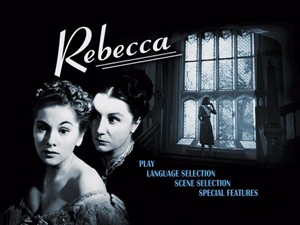
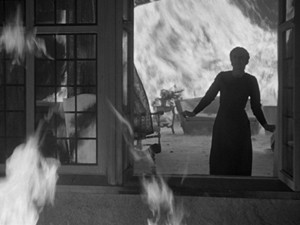
* Rebecca (1940): The movie that brought Alfred Hitchcock to America. Producer David O. Selznick, who was achieving great success through his literary adaptations, needed someone to helm his film of Daphne du Maurier's Rebecca; Hitch was his man.
Rebecca follows the classic model of many a gothic romance. A young woman (Joan Fontaine), given no name and only identified by the "I" in her first-person narrative, has a chance encounter with the dark and mysterious Maxim de Winter (Laurence Olivier). Though of a higher class, de Winter falls for the girl, marries her, and takes her to his spacious estate, Manderlay. There, the opulence is balanced out by the darkness within its proprietor. Maxim is obsessed with his dead wife, the titular Rebecca, and her presence is felt throughout the mansion. The girl also runs into trouble with the governess of Manderlay, Mrs. Danvers (Judith Anderson), who is very protective of the legacy of her former mistress and her own position at Manderlay. She pushes the new Mrs. de Winter into several blunders, including having her dress in the same costume that Rebecca wore to a ball, all triggering more of Maxim's melancholic moods.
The specter of Rebecca is tied up in Rebecca's mysterious death. Ruled a suicide, it is called under suspicion by the dead woman's former lover, Jack (a delightful George Sanders). Uncovering what really happened might free the house of her memory, but with the added threat of Mrs. Danvers, it may take more than that. The Manderlay house is like an otherworldly presence, almost like something out of Poe. Rebecca and, by association, Mrs. Danvers may be too inextricably linked to the surroundings, and the house exerts such an influence on all things in and around it, even the forest that borders it often appears to lean in to destroy the new romantic intruder, reminiscent in a way of the forest turning on Snow White in the Disney film.
Likewise, Hitchcock creates a spooky atmosphere by using the novel's narrative voice. The famous opening line, "Last night, I dreamt I went to Manderlay again," accomplishes several things right from the start. First, the invocation of a dream suggests something separate from everyday reality. Second, it establishes the voice of "I" as an almost ghostly personage unto itself. Third, the past-tense reference to the home tells us that these events have already happened, fate has already decided. Thus, there is an inescapable dread hanging over the new bride.
The use of these many elements--the voiceover, the landscape, the macabre maid--all work toward creating an air of breathless suspense that locks into the similarly breathless passion of the romance quite snugly. Laurence Olivier was always fantastic at playing brooding lovers, including his turn as Heathcliff in Wuthering Heights and, to a degree, his Hamlet. Joan Fontaine's fragile portrayal of his second wife works very well in conjunction with his performance. Though her character has a sense of the world beyond your average ingénue, the ingénue inside her still struggles to keep a toehold, making her not all that dissimilar from Rebecca. She doesn't want to let go of her innocence because she still wishes to enjoy the storybook love affair she has found herself in.
Of course, for all the good work of the leads, the performer that audiences find it nearly impossible to forget is Judith Anderson. Mrs. Danvers is a haunting, strange villainess, with a complicated sexuality that further complicates her murky motives. She can accept no other outcome but to go down with the ship--or, as it were, the house. Separation from her beloved would be a fate worse than death.
Audio/Video: Rebecca is the first of three movies in this set that were previously available from the Criterion Collection, all of which have been out of print for several years. The Criterion discs are very good in terms of picture quality, and I have to say, the difference between their transfers and the versions in the Premiere Collection is negligible. Both have fairly clean prints, with a little digital noise and some enhancement, but with generally good contrast in the black-and-white picture. One might notice different things in different spots were one to compare the DVDs frame by frame, but I don't see much to recommend one over the other. If you were intending to double-dip on any of these three and wanted this set solely for them, I'd say it's not worth it; if you've been waiting for new editions rather than pay the premium for the Criterions, your patience has paid off. The mono audio mix is also pretty much the same.
There are English, Spanish, and French subtitle options.
Extras: Some of the bonus features contained on this disc were originally on the Criterion edition, though several are also dropped. In sheer terms of tonnage as far as supplements, the two-disc Criterion beats this version hands down. Of the material they share, we have audio with Hitchcock and Francois Truffaut, three radio versions of Rebecca, screen tests with Vivien Leigh and Laurence Olivier, as well as Margaret Sullavan (Criterion had a more generous selection from other actress try-outs), and selections from the stills galleries.
The new audio commentary for this set is by respected film critic Richard Schickel. I always enjoy his insightful and spirited commentaries, and Rebecca is no different. There is also an isolated effects and music track showcasing the music of Franz Waxman. Also, alongside the Truffaut audio is more from Peter Bogdanovich.
Two new documentaries gives us the background on this movie. "The Making of Rebecca" (28 minutes) examines the difficult production and how it marked the beginning of Hitchcock's relationship with David O. Selznick and the start of his American career. "The Gothic World of Daphne Du Maurier" (20 minutes) looks at the author's life and the literary tradition that Rebecca is part of, including film clip comparisons to Jane Eyre and Dragonwyck. New commentators, such as authors John Cork, Julie Hyzy, and Nina Auerbach, are on hand to discuss the writer.
Finally, we get the original theatrical trailer (Criterion had a re-issue trailer).
Movie:4.5 stars, Disc: 4.5 stars
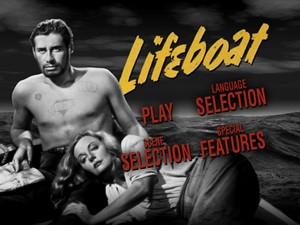
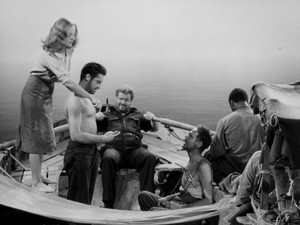
* Lifeboat (1944): If not the first Hitchcock movie I ever saw, Lifeboat was very nearly the first, and it's still one of my top two favorites from his film library (in competition only with Shadow of a Doubt). Like an ocean-faring No Exit, this wartime thriller is masterfully designed by novelist John Steinbeck to wring the most tension possible out of a confined environment.
After a luxury liner's run-in with a German U-Boat, a handful of passengers are stuck in the middle of the Atlantic on a tiny lifeboat, left to fend for themselves. Among them is the opinionated newspaper woman (Tallulah Bankhead), working class men of both the feisty (John Hodiak) and average all-American variety (William Bendix), and a survivor of the sunken submarine (Walter Slezak). The castaways must deal with rationing food and water, limited navigation, and personal grievances. The average Joe, a fella named Gus, has a wounded leg and his condition is rapidly deteriorating, and the stranded Nazi, Willi, is far more devious than anyone anticipated. Naturally, romance also develops between the writer and the crewman.
Despite the limited terrain, Lifeboat is a riveting motion picture. Despite the vast sea that surrounds them, the stranded survivors' greatest danger is in the boat itself. How they deal with each other and the crisis they find themselves in will determine how they go on, and there seems to be at least a small comment being made on American preparedness, what with the Nazi soldier being much more adept at basic survival and despite being outnumbered, regularly outmaneuvering those that should be his captors. Since there is little room for fisticuffs, this requires the script, co-written by Jo Swerling and Ben Hecht, to be smart. Then again, limitations have often made for the best cinema, with restrictions actually inspiring creativity when the filmmakers are faced with trying to figure out how to do what they can with the options available. Lifeboat most surely succeeds at this, covering the gamut of human emotions and maintaining a nail-biting atmosphere all the way to the very end.
Audio/Video: The DVD for Lifeboat exactly mirrors the 2005 edition, down to the same menus and even the same Fox anti-piracy warning that plays when the disc loads (a commercial not on the other discs). The only thing different is the image printed on the disc itself.
The good news is that the old DVD transfer is quite excellent, as is the sound. There are English, Spanish, and French subtitle options.
Extras: Again, this is the same as the 2005 DVD, so all of the same extras are ported over to this version. This means the commentary by Drew Casper, theatrical trailer, stills gallery, and a strong "Making of..." documentary.
Movie:5 stars, Disc: 4 stars
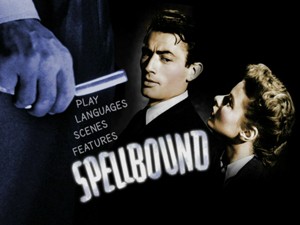
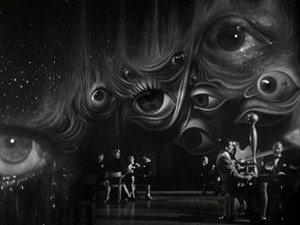
* Spellbound (1945): An early delving into the realms of the mind for Hitchcock, who would continue to be fascinated by the psychological tricks we play on ourselves when dealing with extraordinary circumstances. Though Vertigo is more famous in this area, Spellbound is notable for its dream sequence designed with Salvador Dali, a mini surrealist movie within the movie that provides the key to the mystery. It also has a more passionate and less twisted romance where the female character is more of a participant and less of a victim.
Ingrid Bergman plays Dr. Constance Peters, a psychiatrist at a mental institution who is all about business. Her deep understanding of the human psyche has an ironic consequence in the fact that she has very little emotion in her real life. This changes when the dreamy Dr. Anthony Edwards (Gregory Peck) comes to the hospital. The two fall in love, and the mysterious stranger begins to melt her heart. The only problem is that Dr. Edwards isn't who he says he is, he is an amnesiac who assumed this new identity after the real doctor's death. Known now as John, he must go on the lam, but Constance is convinced of his innocence and she uses a dream he related to her to try to find out what really happened.
This dream establishes an intriguing center for Spellbound, providing Hitchcock with his most ethereal MacGuffin--the prize located at the back of a man's consciousness. Featuring eyeball and scissor-motifs (reminiscent of Dali's collaboration with Luis Bunuel), it uses creative sets and forced perspective to capture the illogical, otherworldly feel of sleeping life. A lot of the sets are pure Dali, with giant faces and melted shapes, and an animated shadow chasing a tiny Gregory Peck represents the flight anxiety so often recurrent in real dreams. Between this and other sensory triggers, such as seeing snow and wavy lines, Constance leads her patient toward repressed childhood memories, experiences that came back to him when Edwards was killed, overwhelming him so much that he suppressed his whole personality in a manner similar to post-traumatic stress disorder. Decoding this, and retrieving his memories, leads to the discovery of the real killer.
The style of Spellbound is very much like your average detective story, it's just that the clues are all hidden within rather than without. The recovery of John's mind ends up linked to the recovery of Constance's heart, creating one of Hitchcock's most fiery, desperate romances. Peck and Bergman make for a great couple, two beautiful people with intense speaking voices, and in Constance's delving into John's psyche, the pair of actors prove evenly matched, eye to eye, word for word. Love conquers all in the end, and splendidly so.
Audio/Video: Spellbound is another reissue of a film that has an out-of-print Criterion edition; please see my notes above in the Rebecca review regarding this. The full frame image is very good quality, mostly clean and free of issue. The audio is also quite crisp, one of the best transfers in the set.
There are English, Spanish, and French subtitle options.
Extras: As with the other movies in the Premiere Collection that had previously been available from Criterion, there are some extras lost and some gained. Of the material the two discs share, there is only a 1948 radio version of the story with Joseph Cotton, material in the stills gallery, and the theatrical trailer.
This round's audio commentary is by Thomas Schatz and Ramirez Berg, and there is also the expected audio section with Peter Bogdanovich interviewing Hitchcock.
Spellbound has three new documentaries for this release:
* "Dreaming with Scissors: Hitchcock, Surrealism and Salvador Dali" (20 minute, 30 seconds): A short history of the famous artist, a background on surrealism and the Freudian influence, and looking at his connection to cinema. It takes us behind the scenes of the famous dream sequence and how it was designed (and why) and a look at what both Hitchcock and Dali originally planned vs. what landed on the screen.
* "Guilt by Association: Psychoanalyzing Spellbound" (19:40): More on the psychological underpinnings of the story and the post-War mind-set, with the focus now off the dream sequence and on everything else. The documentary includes information on David O. Selznick's own psychoanalysis and how this also influenced other movies he produced.
* "A Cinderella Story: Rhonda Fleming" (10:15): The actress who plays the nymphomaniac Mary in Spellbound gives a new interview about the accidental circumstances by which she broke into Hollywood.
Movie:4.5 stars, Disc: 5 stars
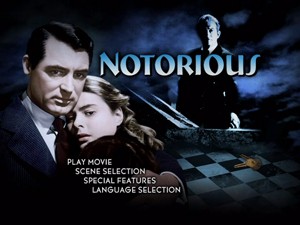
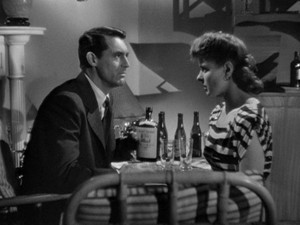
* Notorious (1946): I adore Alfred Hitchcock's Notorious for how it so consistently flummoxes all expectations. Cary Grant and Ingrid Bergman starring in a film together in 1946, at the height of their fame, should have been the romantic cinematic event of the year. Audiences even today have certain expectations when they hear of the coupling. Yet, for most of Notorious, Hitchcock spends the film doing an end run around those expectations. He knows what we want to believe, and he let's us know that he knows, but instead of gratifying our desires, he chooses to make us wait.
In the film, Ingrid Bergman plays Alicia Huberman. Alicia is a notorious woman. While that word probably makes us think of a criminal when heard today, when a woman was notorious in 1946, it wasn't very gangsta. It's a reputation thing, you understand. Ms. Huberman is known to enjoy a drink or two in the company of men. By comparison, the fact that her father has been convicted as a Nazi spy is positively tame. It almost restores a little honor to her public image.
Cary Grant is T.R. Devlin, emphasis on "Devil." The two meet at Alicia's hedonistic blowout following dear ol' dad's sentencing. She likes him at first, but that's before she knows what he does for a living. Devlin is a government agent, and he has a proposition for Alicia--come work for the U.S. and reinvigorate some of her good name. Their wiretaps tell them that she is a patriot and did not condone her father's actions. They want to put her on assignment in Brazil hunting down her father's contacts. The way Devlin gets her to do it, it's almost like blackmail. It's certainly more bullying than your usual rah-rah sign-up speech. It gets through to her, though, and she decides to do it, seeing it as an opportunity to turn over a new leaf.
It's a bit of a character conundrum, since she's presented herself up until now as a wanton woman who cares not for serious things. Clearly, that image was a front, a way to shield herself from the disappointment of her immigrant father. (Mother has departed this Earth, her natural-born U.S. citizenship intact.) If the most important man in her life has betrayed her so, then better to block out all possibilities of any further caring relationships. Her way of flirting with Devlin is to inform him that the only reason she likes the sappy lovesong playing on the hi-fi is because it's such blatant hooey. Here may be the source of her notorious reputation, when her opening line in a romance is to inform the suitor that romance need never come into it. Such talk from the star of Casablanca, whose affectionate glance was worth all of Europe!
There is certainly a lot of complex psychology going on here. Moviegoers heading out to see Notorious would have been going in order to see its stars in many a passionate embrace, yet Alfred Hitchcock keeps inserting himself between them and pushing them apart--and for very dark, painful reasons, at that. The sexual tension doesn't dissipate by being shattered, it only multiplies, each new piece growing to the size of the original. Every time Alicia and Devlin meet to exchange information, it's so devastatingly present, they can barely look at each other. They want to be as close as they once were, you can feel how badly they want to rip each other's clothes off, yet it can't happen. In fact, when they have to kiss in order to fake out Sebastian (Claude Rains), the Nazi fugitive who has now become Alicia's suspicious, jealous husband, it's something they can barely put back in the bottle. Yes, just like what had spilled out of the champagne bottle, the MacGuffin of Notorious, in Sebastian's secret cellar just moments before.
Audio/Video: Notorious is another reissue of a film that has an out-of-print Criterion edition; please see my notes above in the Rebecca review regarding this.
There are English, Spanish, and French subtitle options.
Extras: Some of the bonus features contained on this disc were originally on the Criterion edition, though several are also dropped. Included here for the second time are the 1948 radio version with Joseph Cotton and Ingrid Bergman, the original theatrical trailer, and some of the items in the stills gallery.
The Premiere Collection gives us two new audio commentaries, one by Rick Jewell and the other by Drew Casper. There is also an isolated music and effects audio option, highlighting the music of Roy Webb (Out of the Past). Jewell and Casper split duties so that each covers different ground. Jewell speaks less about Notorious and more about the overall historical context surrounding the films, particularly in terms of the story of RKO; eventually, the story does swing to Notorious and the David O. Selznick relationship with Hitchcock. Casper, on the other hand, goes over the film, looking at the story, artistry, and Hitchcock.
In addition to the now expected audio with Hitchcock, Bogdanovich, and Truffaut and the restoration comparison, there are three new featurettes:
* "The Ultimate Romance: The Making of Notorious" (28 minutes, 20 seconds): A full-on discussion of the plot of the movie with a major focus on the love story, how the movie was developed, and some background on writer Ben Hecht. Featuring the round table of commentators established on The Lodger documentary along with archive photos and clips.
* "Alfred Hitchcock: The Ultimate Spymaster" (13:10): Examining the various espionage stories covered in the Hitch filmmography and how it influenced the genre, up through James Bond.
* "The American Film Institute Award: The Key to Hitchcock" (3:20): Mary Stone talking about the night Hitchcock was given his lifetime award and material from the acceptance speech.
Movie:4.5 stars, Disc: 5 stars
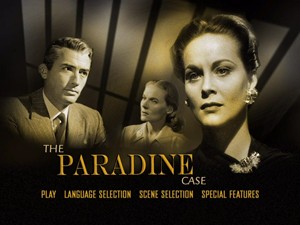

* The Paradine Case (1947): Gregory Peck plays Anthony Keane, a defense attorney in London who has taken the assignment of being the defense attorney in the trial involving the high-profile murder of a wealthy, blind war hero. His client is the dead man's beautiful wife, Maddalena Paradine (Alida Valli, The Third Man), an alluring woman whose magical charm seems to lay in how little she is willing to say. Keane very easily falls in love with her, and the brilliant jurist suddenly finds himself at a loss for how to proceed with his case.
The plot of The Paradine Case, which was written by producer David O. Selznick (alongside other uncredited writers), is of little importance. Its first half is concerned with the investigation, the second is a courtroom drama. The murder plot is not all that complicated, and most viewers will see the truth long before Keane does. Instead, what makes The Paradine Case so good is the various relationships that swirl around the case. Maddalena and her husband were in a love triangle with her husband's valet (Louis Jourdan, Gigi), and after the husband is gone, Keane moves into his position. A second love triangle exists between Maddalena, the lawyer, and his wife (Ann Todd, from David Lean's Madeleine), though it would probably more accurately be between the wife, lawyer, and the job. How men deal with their sense of duty and how it affects the women in their lives is the main area of examination for this picture. Paralleling the Keanes are the self-important judge (Charles Laughton) and his troubled wife (Ethel Barrymore), who has paid the price of years of being neglected for duty. In between is Judy (Joan Tetzel, Duel in the Sun), the daughter of the man who hired Keane and a friend of the family. Her healthy skepticism, perhaps only possible as the one woman not tied to any man, allows her to cut through Keane's excuses and get to the matter at hand.
In many ways, The Paradine Case fits well next to Notorious in how it pours over the lengths women will go to in order to see their men succeed. Here we have a man who is far more fallible than Cary Grant's Agent Devlin, as Keane is less caught up in the circumstance of his job and more an agent of his own fate. His poor choices and refusal to look beyond the jail cell and the courtroom where he sees the new object of his affection does the most damage in that rather than ask his wife to do something the way Devlin sent Alicia into the maw of danger, Keane asks his wife to do nothing but stand by and wait.
Visually, The Paradine Case really comes alive in the cramped, stuffy courtroom. Hitchcock takes his camera anywhere he needs it to, whether taking a bird's eye view from the balconies or right into the holding box where they keep the accused. In one remarkable scene, the director puts Maddalena at the center of the screen and uses her as his pivot to follow her lover to the witness stand, the deep focus unveiling the depths of her inescapable guilt.
Audio/Video: The 1.33:1 transfer here is really good. One will see some halo effects, but overall, the picture quality is clean and without too much external noise. Ditto for the mono soundtrack.
There are English, Spanish, and French subtitle options.
Extras: Concluding the box in much the same way as it started, we get two extra audio tracks, a commentary by returning historians Stephen Rebello and Bill Krohn and an isolated music and effects track (the score is by Franz Waxman, a regular Hitchcock collaborator and musical contributor to many a film noir), a stills gallery with on-set photos and promotional items, a restoration comparison, and audio from the Bogdanovich interview. Additionally, we get the original theatrical trailer and a 1949 radio version of the story starring Joseph Cotten.
Movie:4 stars, Disc: 4 stars
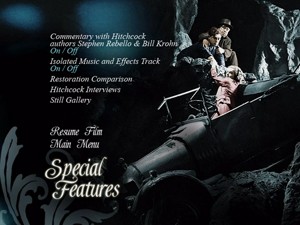
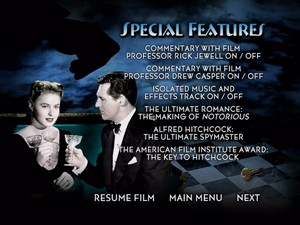
THE DVD
The Alfred Hitchcock Premiere Collection is handsomely packaged in a spiral notebook that features a multi-page section for each film. These sections are illustrated with photographs, rounded out by story details and production facts, and finished off with chapter selections and lists of bonus features. The DVDs fit inside sleeves cut into extra-sturdy sheets that separate each section, and the sleeve pages feature the standard credits for each movie.
This notebook fits inside a hard plastic case that is decorated with a shattered glass/bullet hole design. When the book is placed inside, the bullet hole is positioned over Alfred Hitchcock's face. There is also a paper overlay that details the contents of the set.
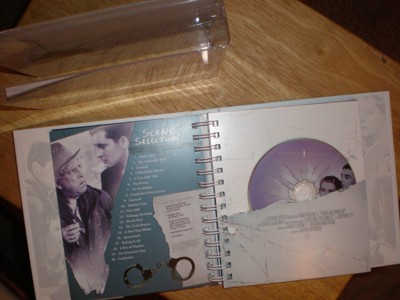
Video:
Though I have noted the general picture quality in each individual movie review, I feel I should also note that I did find some of the discs in the Premiere Collection to be slightly buggy. In particular, both The Lodger and Young and Innocent had problems loading in my main DVD player, with The Lodger actually taking some fiddling with my remote in order to play it properly. Rebecca also proved cranky in loading, creating the most horrendous noises in my DVD player, and like The Lodger sometimes refusing to load at all. Rebecca also appeared to be dirty straight out of the package, though some of the spots on the surface would not come off when I tried to clean it.
There is already an active discussion in the DVD Talk Forums regarding this, and as it turns out, this is not a problem isolated to my set. In addition, it's not even isolated to the discs I found issue with, but is seemingly random as far as to which ones are affected. (One theory is the tight wrapping on the packaging is warping discs, a problem that will not be apparent on individual releases.) So far, there appears to be no studio response to this mishap. I, for one, would like to add my voice to a chorus demanding a full replacement program.
What a distressing development! This is truly a wonderful set, and were this a safer purchase, I'd easily give the Alfred Hitchcock Premiere Collection our highest ranking. But alas, I must instead rate it...
FINAL THOUGHTS:
Recommended. On the basis of the movies, and even on the basis of the intentions of this set, I would classify Alfred Hitchcock Premiere Collection as not just "Highly Recommended," but I'd push it all the way up to our Collector Series. It's a good looking package with truly excellent films, and any film fan should have as much Hitchcock in their possession as possible. With the master of suspense's early American pictures, as well as three of his important British productions. Lifeboat and Notorious are two of my absolute favorites, and this restoration of The Lodger is a marvelous revelation. Sadly, giving manufacturing errors that appear to trouble to entire run of boxed sets, the Alfred Hitchcock Premiere Collection has a dark cloud hanging over it that may make waiting to see how the individual releases of these films fare rather than diving straight in. Caveat emptor in the extreme.
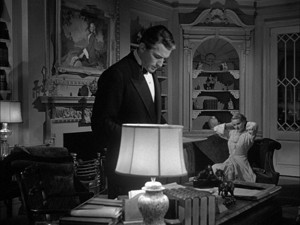
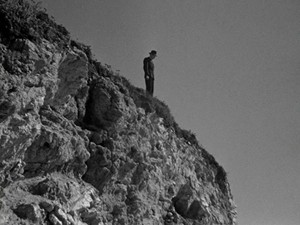
The Paradine Case; Rebecca
Jamie S. Rich is a novelist and comic book writer. He is best known for his collaborations with Joelle Jones, including the hardboiled crime comic book You Have Killed Me, the challenging romance 12 Reasons Why I Love Her, and the 2007 prose novel Have You Seen the Horizon Lately?, for which Jones did the cover. All three were published by Oni Press. His most recent projects include the futuristic romance A Boy and a Girl with Natalie Nourigat; Archer Coe and the Thousand Natural Shocks, a loopy crime tale drawn by Dan Christensen; and the horror miniseries Madame Frankenstein, a collaboration with Megan Levens. Follow Rich's blog at Confessions123.com.
|
| Popular Reviews |
| Sponsored Links |
|
|
| Sponsored Links |
|
|
| Release List | Reviews | Shop | Newsletter | Forum | DVD Giveaways | Blu-Ray | Advertise |
|
Copyright 2024 DVDTalk.com All Rights Reserved. Legal Info, Privacy Policy, Terms of Use,
Manage Preferences,
Your Privacy Choices | |||||||









